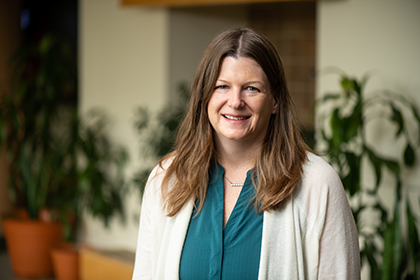Associate Professor of Pharmacology Karen Glass, Ph.D., was recently honored with an award totaling more than $380,000 from the MCA program for her proposed project, “Application of Cryo-Electron Microscopy to Determine the Structure of Epigenetic Regulatory Complexes.” Glass is the first UVM faculty member to receive an NSF MCA award.

Associate Professor of Pharmacology Karen Glass, Ph.D.
The National Science Foundation’s Mid-Career Advancement (NSF MCA) program is a prestigious award that provides mid-career investigators in science and engineering with an opportunity to significantly boost their research programs through collaborative partnerships, often with institutions other than their own. The program favors projects that aim to offer fresh perspectives on existing issues or investigate new, previously unexplored questions, leveraging expertise and methodologies from diverse fields.
Associate Professor of Pharmacology Karen Glass, Ph.D., was recently honored with an award totaling more than $380,000 from the MCA program for her proposed project, “Application of Cryo-Electron Microscopy to Determine the Structure of Epigenetic Regulatory Complexes.” Glass is the first UVM faculty member to receive an NSF MCA award.
Single-particle cryo-electron microscopy (CryoEM) is a powerful tool for studying the structures of proteins and other molecules in cells. Specifically, this project investigates how chromatin reader domains, like bromodomains, interact with histone proteins and nucleosomes to regulate DNA processes. Glass, working alongside experts at the University of Michigan and the National Center for CryoEM Access and Training (NCCAT), aims to use CryoEM to understand epigenetic gene regulatory mechanisms. This collaboration will help obtain high-resolution protein-DNA structures, filling gaps left by X-ray crystallography and nuclear magnetic resonance.
CryoEM is a vital tool in modern biological research. Glass plans to share her new knowledge by helping to revitalize the CryoEM facility at the University of Vermont—training faculty, lab personnel, and students in this cutting-edge technique.
“I am thrilled to have the support and protected time offered through this NSF MCA award to take my research program in a new direction, and I am honored to be the first faculty member to receive it. I hope to inspire other colleagues at the Larner College of Medicine, and UVM at large, to apply to this program,” Glass said.